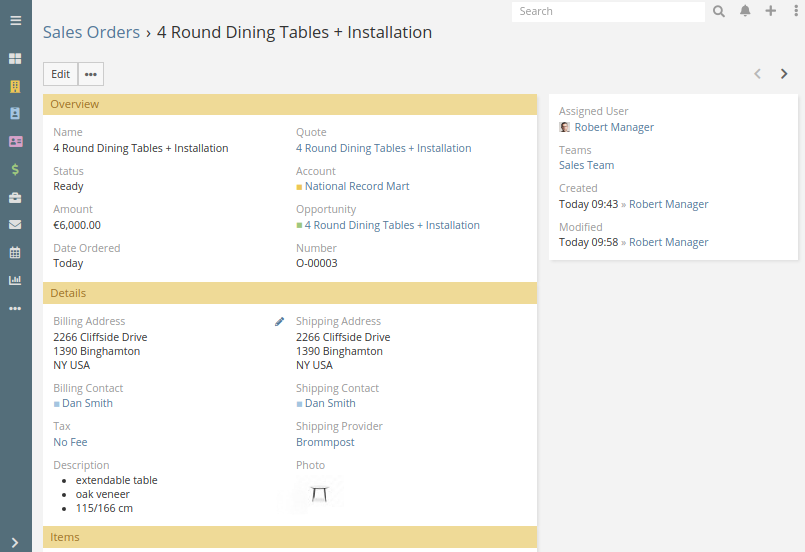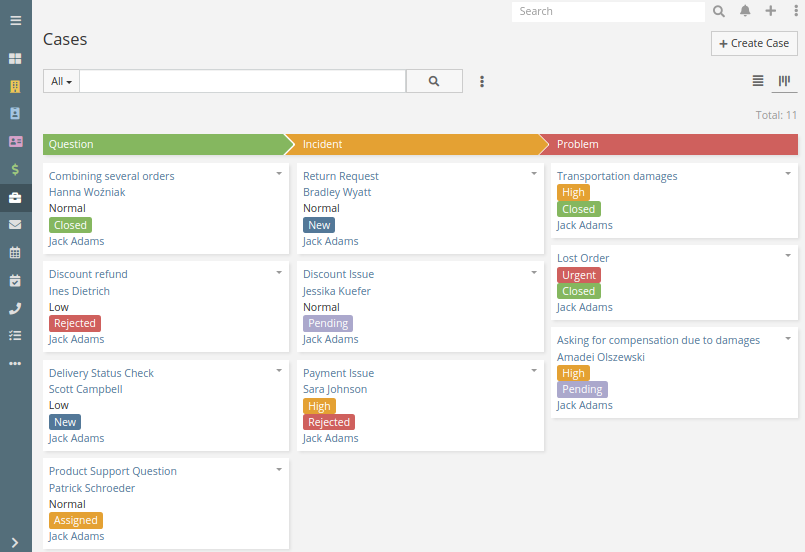CRM for Manufacturing
Producing a great product alone is not enough to reach success in the manufacturing sector. These days, it’s essential to take care not only of the production processes, but also to think about how to introduce the finished goods to the market and sell them to those who need them. Since manufacturing companies are B2B businesses in most cases, their sales cycle is quite challenging. It is usually a lengthy process involving multiple interactions with customers to build strong business connections with them.
One of the ways to ensure the marketing and sales activities run efficiently and smoothly is by implementing a CRM solution for manufacturing businesses. This software provides the ability to maintain the right balance between organizing your production processes and managing sales, marketing, and maintaining long-term relationships with customers. Such a system helps to better understand the customers’ needs, keep track of every deal and improve a lot of internal business processes.
What are the benefits of CRM software for the manufacturing business?
CRM optimizes customer data management
The manufacturing industry is heavily reliant on repeat sales that obviously require maintaining loyal customer relationships. Yet, without a centralized database with customer information, it’s difficult to keep track of customer interactions, manage pre-sale and post-sale communications or quickly find important deal-related details. A reliable CRM platform can streamline the management of current and potential customer data. It allows companies to unify the data coming from various sources in one secure place. By using complete customer profiles, the salespeople can clearly see the contact details, preferences, history of past communication and previous orders, etc. In this way, it becomes substantially easier to personalize product offers to each client and persuade potential customers to decide in your favor.
CRM streamlines sales management
Regardless of the industry, knowing where you are with your sales is crucial for the success of your business. The CRM system provides greater visibility into the sales pipeline. It allows manufacturing businesses to customize and visualize their sales pipeline, keep track of all deals and identify the most promising opportunities. As a result, your sales representatives can instantly see the stage of each opportunity and how much this opportunity is worth. Aside from that, the CRM platform can also help to automate sales management processes. You can define workflow rules or BPM processes that will be triggered upon specified conditions and automate the creation of follow-ups, sending notifications, emailing quotes, sales orders and invoices, etc.

CRM optimizes inventory tracking
Failing to optimize inventory management can lead to financial losses or extra expenses. The implementation of the CRM solution can give manufacturers accurate and realistic insights into their inventory management, production processes, and finished goods distribution. With the system’s help, it becomes easier to monitor the number of raw materials and finished goods in stock, manage production cycles and determine the products that will be in demand in the near future. Armed with that data, your company will be able to improve production planning and maximize productivity and profits.
CRM boosts marketing strategies
Another great benefit of CRM software is its ability to improve the performance of your marketing campaigns. By using all the data stored in the platform, your marketing team can better understand customer behavior, launch targeted campaigns, and personalize marketing offers for each customer. As a result, you can send newsletters about the products that might interest your customers, and create follow-up, post-sale campaigns to ensure that your customers will come back for another purchase.
CRM improves customer service
The CRM platform can also help in optimizing customer service and support. It provides the ability to support multichannel case creation (via customer portal, emails, or calls), keeps track of the status of each case, and develops a knowledge base with resolutions to the most common issues. Besides, the company can analyze the customer cases, including complaints, returns, and warranty requests to identify the weak spots in their products or services and improve them.

All in all, implementing CRM software for the manufacturing sector can help improve a lot of critically important processes in the company, including sales, reporting, customer support, marketing, production planning, etc. Aside from that, it allows businesses to concentrate on building relationships with their customers. By making customers a priority, businesses gain a chance to increase customer retention rates and boost revenue.
Interested in making your business more efficient? Let’s do it together with EspoCRM!
